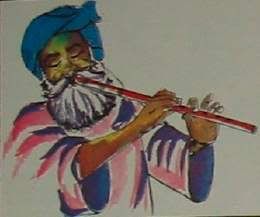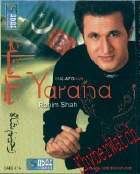Adil Najam
 It is both sad and surprising that the NWFP gets such little credit for its cultural and intellectual contributions to contemporary Pakistan despite the immense impact that artists and intellectuals from the NWFP have had.
It is both sad and surprising that the NWFP gets such little credit for its cultural and intellectual contributions to contemporary Pakistan despite the immense impact that artists and intellectuals from the NWFP have had.
Of course, the Frontier is not the only part of the country whose contributions get drowned out amidst the (sometimes self-c ongratulatory) discourse about Lahore, Karachi and (more recently) Islamabad [as someone who grew up in all three of these wonderful cities – enough, in fact, to consider myself a proud native of all three – I hope I can say this without sounding accusatory]. These cities (especially the first two) have always attracted great talent from elsewhere in the country. They have had the generosity of heart to not only welcome but to embrace all comers; so much so that the new comers become natives and are seen as such.
ongratulatory) discourse about Lahore, Karachi and (more recently) Islamabad [as someone who grew up in all three of these wonderful cities – enough, in fact, to consider myself a proud native of all three – I hope I can say this without sounding accusatory]. These cities (especially the first two) have always attracted great talent from elsewhere in the country. They have had the generosity of heart to not only welcome but to embrace all comers; so much so that the new comers become natives and are seen as such.
My point is not to undermine the importance of the more visible centers of artistic and intellectual life, but to express a concern that those who live outside of NWFP can sometimes tend to ignore its contributions.
I hope that our readers will add to this list, but let me name just a few luminaries that come immediately to mind:
- Amongst poets, one of the pre-eminent living Urdu poets – possibly the pre-eminent living Urdu poet – Ahmad Faraz, a Pushto-speaking Pathan, born in Nowshera, studied in Peshawar.
- Amongst prose writers, the legendary Urdu essayist Syed Ahmed Shah Patras Bokhari — and his brother Zulfiqar Bokhari, an equally legendary broadcaster renowned for his Urdu recitation of verse and prose — were both from Peshawar.
- Amongst dramatic actors the soil of the frontier has been amazingly rich. Both Dilip Kumar and Raj Kapoor were born in Peshawar. Qavi and Firdous Jamal – two of the top dramatic actors on Pakistan Television – were also both raised in Peshawar.
- Amongst comedians, filmstar Rangeela, may have made his name in Punjabi slapstick but was born Saeed Khan in Afghanistan and grew up in Peshawar.
That, of course, is just a sampling. One day I hope we will do proper posts on Peshawar and its intellectual and cultural contributions. Right now, I just wanted to get this point off my chest by way of introducing a wonderful music video from Pushto pop music sensation, Rahim Shah.
Long-time readers would remember that we did a short post on Rahim Shah in early July (here), which features a hilarious video where someone had dubbed a Rahim Shah song onto a Michael Jackson video (here). if you have not seen it, I would recommend doing so. After looking at the video, do listen to the song without looking at the video… it is catchy and you can see why Rahim Shah has become such a Pushto pop phenomenon.
 He is, in fact, part of a minor revolution going on in Pakistan in pop-music in regional languages. Rahim Shah is the central figure in Pushto pop music today and also has a number of hits in Urdu, especially including Jhoola. In fact, he has been singing also in Punjabi and Sindhi and his Punjabi song Tairay ishq nay has also done very well.
He is, in fact, part of a minor revolution going on in Pakistan in pop-music in regional languages. Rahim Shah is the central figure in Pushto pop music today and also has a number of hits in Urdu, especially including Jhoola. In fact, he has been singing also in Punjabi and Sindhi and his Punjabi song Tairay ishq nay has also done very well.
A colleague working in Kabul tells me that he is an equally big sensation across the border in Afghanistan. This particular video is a good reason why. I have been mesmerized by the music and video for the last many weeks. You do not need to know the exact words to understand the meaning; it is a classical tale of love. I beleive it is in Dari (or is it Farsi?). The words should mostly be familiar not just to Pushto-speakers but also those who understand any Persian. The theme should be familiar to everyone everywhere. Enjoy:
Especially given the headlines of the last many weeks, this song is also politically poignant. It is a love story of a Pakistani man and an Afghan woman. See especially the last scene with the exchange of flags. The Pak-Afghan theme is a common focus in a bunch of Rahim Shah songs. I hope this his people-to-people music diplomacy turns out to be more successful than efforts (or lack thereof) from official channels on the two sides.




















































Nice song and nice post. NWFP has a very proud intellectual tradition that goes back in history with Peshawar as a center of intellectual life well before any other existing major city in modern Pakistan. Whatever you may think of their politics, the NWFP has also contributed some of the ablest technocrats to the Pakistan Civil Service. Ghulam Ishaq Khan, for example, did not distinguish himself once he became political in teh later Zia years onwards, but all who served with him talk about his great intellectual prowess. Sartaj Aziz, similarly has not been an impressive politician, but was a very able and intellectually strong technocrat in the Pakistan and then international civil service. The point is that NWFP’s intellectual contributions are long and deep.
Adil, it’s a great picture of Islamia College Peshawar in the header. I wonder if you could zoom out a bit so that the clock tower in the middle can be seen in full.
And, by the way, other than Dilip Kumar, Raj kapoor and, an earlier famous actor, Prithvi Raj, Peshawar also produced Madhoo Bala, the heartthrob and a leading actress of Indian movies of the 50s and 60s. Her actual name was Mumtaz, which might have changed to Mumtaj in Bombay.
Very true, pashtun culture tends to get looked down in the rest of Pakistan. Pashto as a rule hasn’t been patronised by any government because ethnic culture is considered separatist by establishment people. Recently several groups have tried to set up Pashto TV channels and in most cases PEMRA has blocked them..on the other hand people like Rahim Shah made it big first through non pashto music and then went into pashto (he was trained in urdu ghazals firstly and is karachi based)
This is a really nice song and a very catchy music and a great video. Is his urdu songs equally good? Any reccomendations.
I appreciate the spirit and effort of this article – right in-line with the subject of the article. I would also like to point out that perhaps the most prominent contribution, that is often overlooked, is the influence of Khushal Khan Khattak (b.1613-1690) on Allama Iqbal’s poetry directly and Pakistan movement, indirectly. As we say that the Iqbal’s poetry became a fuel for the moment of Pakistan.
Khushal Khan Khattak, a great philosopher and poet, first presented the philosophy of “Shaheen” and “murd-e-Momin” during 1660’s. Which was translated into German and Persian and became inspiration for German Philosopher Nietzsche(1844 – 1900) and Allama Iqbal. Some of Iqbal’s poetry seems to be a direct translation from Khushal baba’s Pushto poems into Iqbal Urdu Poems e.g: ,” Muhabbat mujhe un jawano se he, sitaro pe jo dalthe hain kamand,” Khushal Khan Khattak originally said,” “Za da hagha shazalmo zine zaregam Che ranisee da asmaan stoori pa las.” (exact translation) and umerous other examples like that.
At one point Iqbal also described Khushal Khan Khattak’s poetry and personality was the main inspiration for Allama’s ideology. He called Khan Baba as a versatile genius with poetry, philosophy, ethics, medicine with simplicity and directness of expression with out any wickedness and with love of freedom.
Needless to say, that Khan Baba’s message was limited to Pushtoon while Iqbal expanded his message to the entire Muslim umma.
I just wanted to point out Khushal khan Khattak’s contributation to Pakistan movement and its literature though Pakistan came into being almost 300 years after his life.